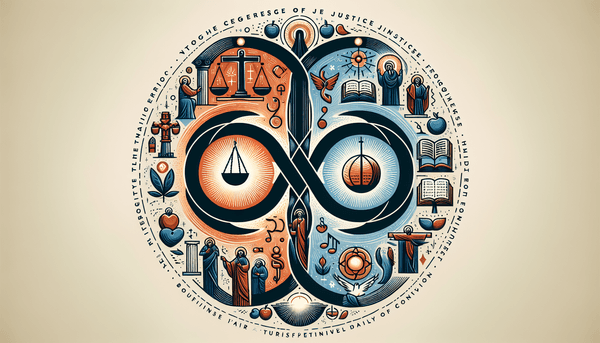Understanding Repentance
Repentance is more than just feeling remorseful; it is a transformative process that is clearly outlined in the Bible. In Acts 3:19 we read, 'Repent, then, and turn to God, so that your sins may be wiped out, that times of refreshing may come from the Lord.' This verse, along with others, outlines a four-step process of repentance. Firstly, we must acknowledge our sins, admitting our wrongdoings against God's laws. Second, we must feel genuine sorrow for our actions. Third, we are called to turn away from our sinful behaviors. Lastly, we turn to God, seeking His forgiveness and guidance to change our lives. In 2 Corinthians 7:10, the Apostle Paul differentiates between godly sorrow, which leads to salvation, and worldly sorrow, which leads to death, urging us to aim for the former. Ezekiel 18:21-22 further assures us that if we turn from our wicked ways, we will live and not die, for our past sins will not be remembered against us.
God's Forgiveness and the Ten Commandments
God's capacity for forgiveness is profound and boundless, even when we have broken the Ten Commandments. The story of King David is a testament to this, as he committed sins that broke several of the commandments, including adultery and murder. Yet, after his repentance, he found redemption. Psalm 51 captures David's heartfelt sorrow and plea for God's mercy. Similarly, 1 John 1:9 offers us this promise: 'If we confess our sins, He is faithful and just to forgive us our sins and to cleanse us from all unrighteousness.' Therefore, through genuine repentance and faith in Jesus Christ, we too can receive God’s forgiveness.
Conclusion
In conclusion, the journey to forgiveness is one that must be taken with a sincere heart and a willingness to transform one's life. Repentance is not merely an emotional response but a decisive action towards a renewed relationship with God. As believers, we have the assurance that through repentance and faith in Jesus Christ, no sin is too great to be forgiven. May this message encourage you to approach God with a contrite heart, knowing that His grace is sufficient for you and His power is made perfect in weakness.
FAQ
Q: Can God forgive you if you have broken a Ten Commandment?
A: Yes, God's capacity for forgiveness is profound and boundless. The Bible speaks to the forgiveness of sins, including those that break the Ten Commandments, through genuine repentance and faith in Jesus Christ. In the New Testament, 1 John 1:9 assures us, 'If we confess our sins, He is faithful and just to forgive us our sins and to cleanse us from all unrighteousness.'
Q: What is repentance?
A: Repentance is a foundational concept in the Bible, embodying a sincere turning away from sin and turning towards God. It involves not just a feeling of sorrow for wrongdoing but also a decisive change in direction, a transformation of heart and behavior.
Q: What is the essence of repentance?
A: The essence of repentance is captured in Acts 3:19, which says, 'Repent, then, and turn to God, so that your sins may be wiped out, that times of refreshing may come from the Lord.' This verse highlights several key aspects of repentance: acknowledgment of sin, sorrow for sin, turning away from sin, and turning to God.
Q: What does Psalm 51 teach us about repentance?
A: Psalm 51 shows us King David's response to his own sin. It captures his heartfelt sorrow and desire for forgiveness, demonstrating a profound expression of repentance and the seeking of God's mercy.






